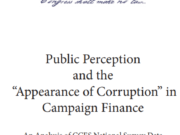Below is a transcript of Bradley A. Smith’s opening remarks:
When I was at the Federal Election Commission I used to keep a file of letters that we received from ordinary citizens who were caught up in our investigations. These people weren’t trying to corrupt anything they were just trying to do what they thought was their civic duty by participating in a political campaign. A CPA who was a volunteer campaign treasurer, and was facing over $7,000 in personal fines wrote: “No job I have ever undertaken caused me more stress than this one. I was frightened and concerned every day that I would do something wrong.” Another volunteer wrote: “We were just honest, hard working, tax paying Americans who wanted to make a difference . . . , we are so disillusioned with the [legal] difficulty of running for office that we wonder why anyone other than a professional would attempt to do so.” One volunteer summed up: “I will NEVER, all caps, be involved with a political campaign again.”
These are not isolated cases. In one study done a couple years ago 250 citizens were asked to fill out compulsory forms, forms you have to fill out under various state laws to participate in campaigns. Not a single one was able to get it right. In fact the average score correct was 41%. Had these people been trying to volunteer for an actual campaign, they would all have faced fines and jail time.
So there is something wrong in our system. There is something that is corrupting American Democracy. But it is emphatically not that there is too much regulation. In fact federal laws and federal regulations total over 376,000 words. That’s about 75% longer than Plato’s Republic. On top of that we can add 1900 advisory opinions and thousands of pages of state laws and thousands of federal pages trying to explain the 376,000 words that are actually in the regulations.
With all that, it’s easy to forget that prior to 1974, there were no limits at all on what a person could contribute to a candidate. A million dollars, fine. And very, very limited disclosure. Under that deregulated system we became the strongest democracy on earth, the wealthiest nation on earth. We built the American middle class; we passed meaningful legislation like the Voting Rights Act and Medicare with huge bipartisan majorities. Congress actually seemed to work in those days. We put a man to the moon under that system.
Today, there are still about a dozen states whose state system are unregulated or very lightly regulated and those states are routinely found by nonpartisan sources to be the least corrupt and best governed states in America. So why do we have this system? Well in the 1970s, various people, self-styled reformers said you’ve got to regulate this or we’re going to have another Watergate. Well they regulated it and we continue to have scandal.
Meanwhile the spending advantage for incumbents over challengers has more than doubled. Incumbents spend more time raising funds than ever because it’s so hard to raise funds. We find that incumbent reelection rates are at record highs and find that ordinary citizens are shut out of the process. So my colleagues over here bear a heavy burden to show all of this regulation is really worthwhile. That this is a better system that we’ve created in the last 40 years than the system that we use to elect Kennedy and Eisenhower and Truman and FDR and Teddy Roosevelt and Coolidge and Lincoln for that matter is really worth doing.














